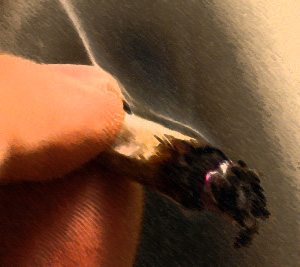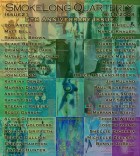This story gave me chills, Kath! Except, it’s not a story. It’s a series of (seemingly) random details. But, it’s a perfectly complete story! From where did you gather these details? Do you choose many you end up throwing away? Are the “irrelevant” details what make a life?
Thanks so much! I do think that “a series of (seemingly) random details” describes a lot of what I write. I’m glad it still feels like a story to you, Joe. This is how stories come to me and I can’t decide if it’s a strength or a weakness of mine, but it’s how I write a lot of flash. I do love writing dialogue and scenes though, too.
I know that I edited this as I wrote it. I always end up cutting things, the weak stuff, the boring stuff. I wanted the story to contain a life as succinctly as possible, so I kept the details that seemed to speak to much more, but the details didn’t come to me in any sort of planned or intentional way.
And yes, absolutely, I think the irrelevent stuff makes a life! Or, rather, that’s what makes it interesting.
As readers probably know, half of the stories in current issue of SmokeLong belong to past staff and guest editors. You were on staff for how long? What did you, as an editor, look for in stories you selected for SmokeLong? What about your own story “Repair Man” fits these criteria?
I think it was two years. I know I worked on several issues. I always, always looked for the stories that surprised me in a good way. I loved the stories that took risks but not in a self-conscious way if that makes any sense. I think if “Repair Man” had come in from someone else I would have liked it and wanted to publish it. I was always partial to meandering, non-plotted stories, ha.
Time is unfixed. Things happen, happened or might happen; “he was once an old man.” How did it get this way? Is this the way the world works? Do you write it the way you see it?
I wanted to open the story up and keep it very short at the same time. I wanted to turn it on its side and have the future to impinge on Trey and Mattie’s present. In an odd way, I feel it makes the story bigger without getting too carried away with the concept. I do think this is the way the world works, time being an invention of humans to make sense of things. It’s challenging to imagine time doesn’t exist at all, at least the way we think it does. I don’t know. This is probably my jet lag talking.
What I love about flash, your flash especially, is its excellent concentration of expression: “alone on an ice morning.” Does it matter that we don’t really know what this means? Is it better to feel what it means? Do you write more intuitively or concretely?
For some reason, for me, the word “icy” never occurred to me and that would be the logical choice. It was always an “ice morning” and I can’t tell you why, Joe. It was an intuitive choice, absolutely and that’s mostly how I write. I’m very particular about words, but I’m not interested in making the reader see and feel exactly what I see and feel. And that probably makes for less clarity, but I like the possibility of several different interpretations of the same fluid image.
This issue marks SmokeLong‘s fifth anniversary, which has the staff thinking a lot about longevity and growth. There’s no denying the literary arena is fickle, with journals coming and going, writers shooting onto the scene then falling into a long hiatus, editors changing houses, agents merging, trends in what’s hot, what’s not. How do you, as a writer, endure the ups and downs? Have you experienced any setbacks? What measures have you taken to grow?
I don’t think it works the same way in writing, in art, as it may in other fields or endeavours. I mean, you don’t just keep trying and practicing working and then get rewarded with consistent improvement and success. I think it’s possible to actually get worse for a while. Because in art you have to keep trying new things and taking risks to truly get better and most of your risks will be failures. You just can’t keep going with what worked before…or you can, but you really won’t grow. You may continue to publish, but you won’t grow.
I have a terrible work ethic. I don’t write every day. I am not hugely ambitious or striving. I’ve had really painful plateaus (not so much setbacks) as a writer. But I will tell you that I’m always turning it over in my mind. I’m always reading and thinking and feeling and trying to figure out how to bring everything I can to the page in some good and beautiful way. I am sort of quietly obsessed.



 The core workshop of SmokeLong Fitness is all in writing, so you can take part from anywhere at anytime. We are excited about creating a supportive, consistent and structured environment for flash writers to work on their craft in a community. We are thrilled and proud to say that our workshop participants have won, placed, or been listed in every major flash competition. Community works.
The core workshop of SmokeLong Fitness is all in writing, so you can take part from anywhere at anytime. We are excited about creating a supportive, consistent and structured environment for flash writers to work on their craft in a community. We are thrilled and proud to say that our workshop participants have won, placed, or been listed in every major flash competition. Community works.